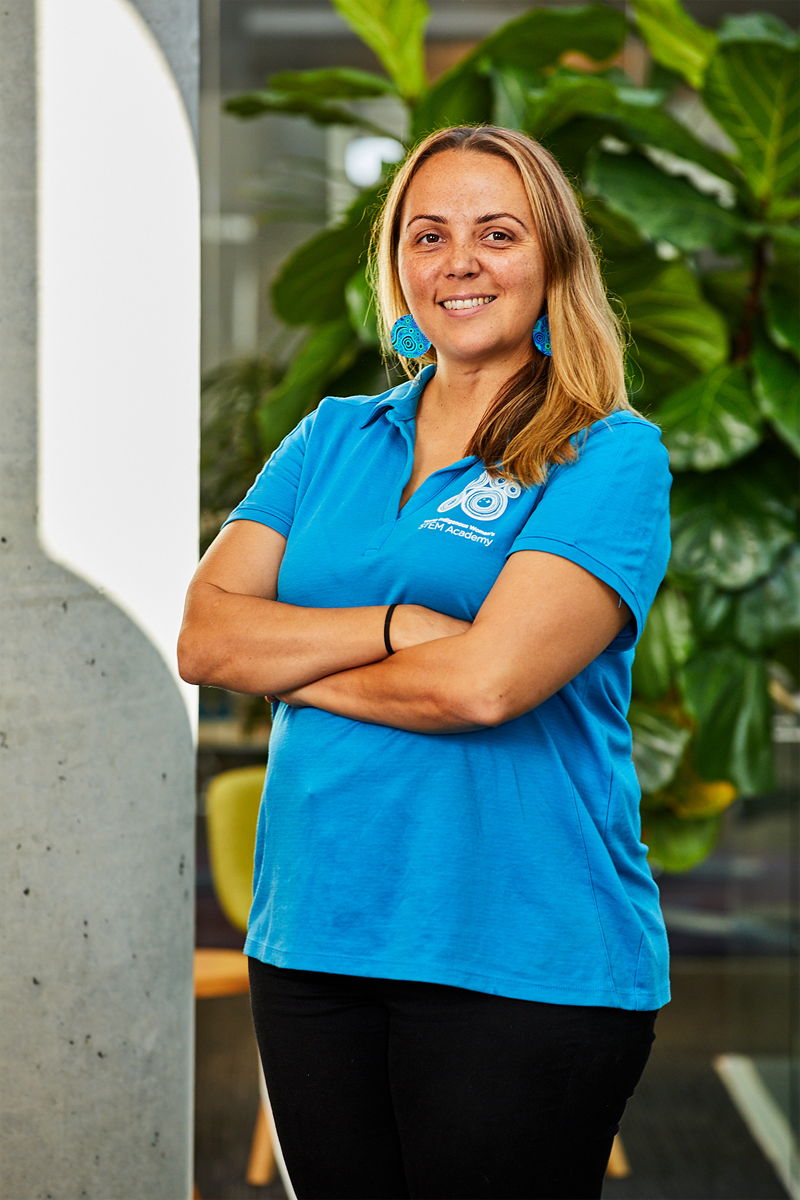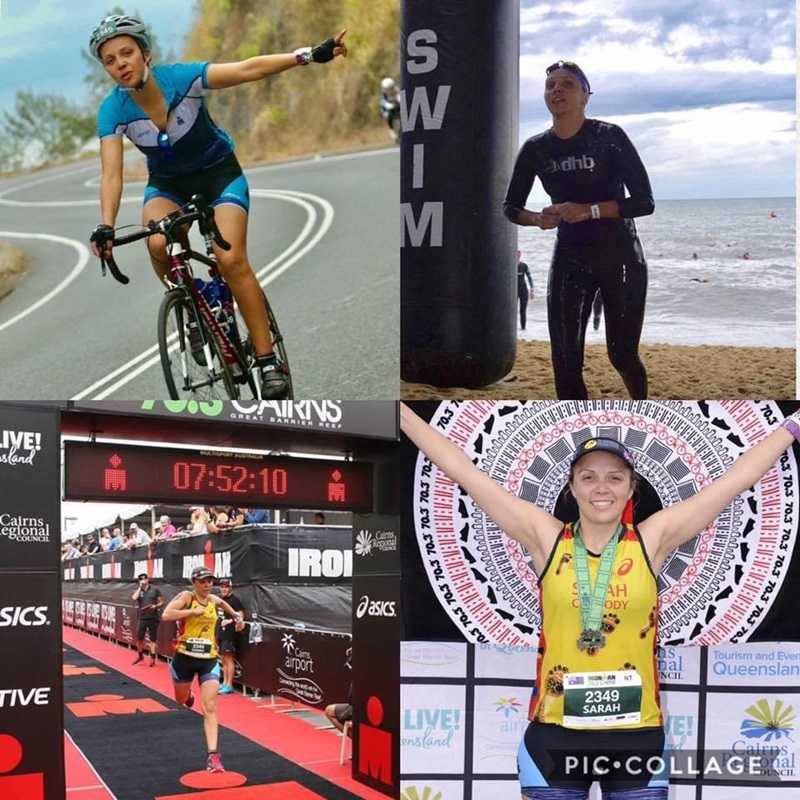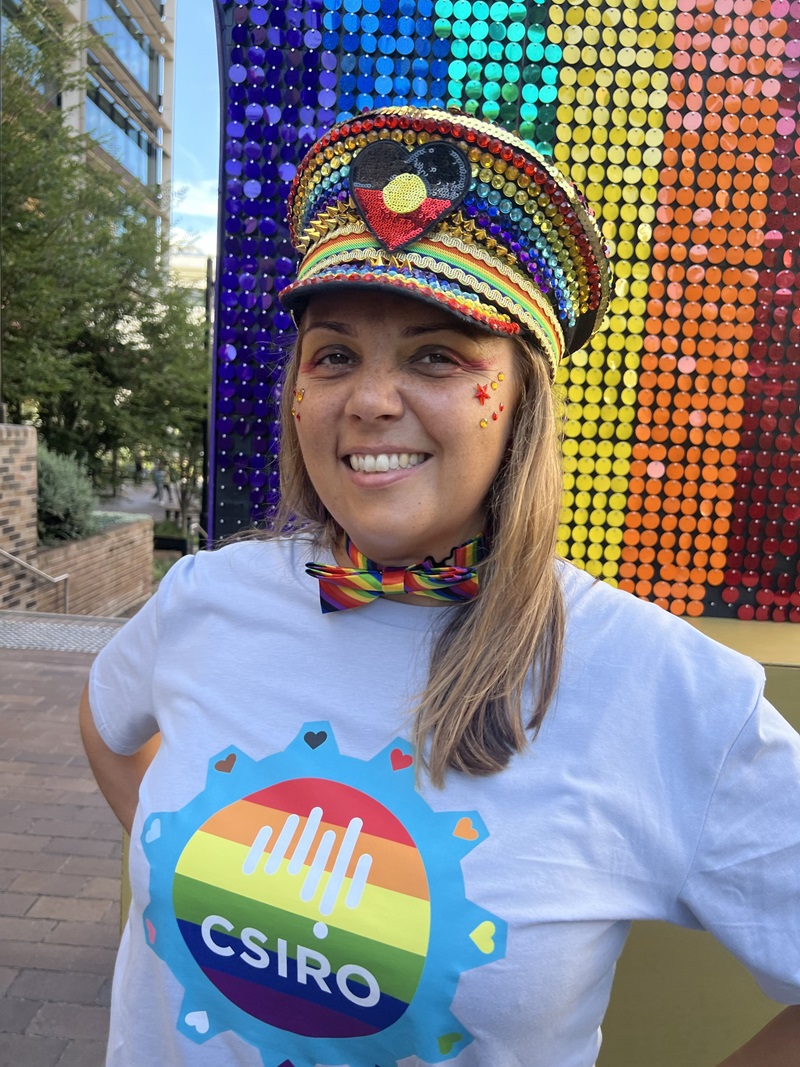Key points
- Sarah Landers is a queer Aboriginal woman and mother who works in science, technology, engineering and maths (STEM) education.
- She sees the challenges she has faced as blessings and believes in being open minded and always learning.
- Sarah is working with our Young Indigenous STEM Academy to support Aboriginal and Torres Strait Islander girls to pursue STEM careers.
For Sarah, life will never be the same again after marching in Sydney's Mardi Gras parade this year. She was part of our float, which included our largest number of LGBTIQA+ identifying marchers and our largest number of Indigenous marchers. She was proud to celebrate her Aboriginality and her sexuality with her CSIRO colleagues.
The Dieri woman and mother of two came out as a lesbian after the end of her 17-year relationship, and quickly learned to walk in two worlds.
"I’m constantly adapting and reading the room to feel safe and have a sense of belonging," Sarah says.
"You can feel and sense the judgement on people’s faces and in their behaviour – how Aboriginal am I? Her skin isn’t that dark - does she speak a language? Will I make you feel safe and comfortable?"
But while marching down Oxford Street in Sydney dancing to NT Aboriginal artist Jessica Mauboy with her colleagues, surrounded by a crowd screaming their support, she felt like she was home.

Finding purpose
Sarah has more than 20 years of experience working in education, community services and Aboriginal health services. Supporting Aboriginal children and communities has always been her passion.
Her ancestors’ land is far northeast of South Australia between Katithunda – Lake Eyre in the west and Moomba in the east.
"They cover Mumpy (Murnpeowie Station) in the south and up to Clifton Hills station in the north," Sarah says.
"As an Aboriginal woman and mother, I have lived and working experience with Aboriginal people. It’s my true purpose in life."
This dedication extends to her current role as an academic coordinator for the Young Indigenous Women’s STEM Academy. She's championing the next generation of Aboriginal and Torres Strait Islander female leaders, role models, and game changers in science, technology, engineering and maths (STEM).
"It’s important that we support more Aboriginal and Torres Strait Islander women into STEM career pathways and roles. Our people are the very first scientists. That’s something we can all be proud of," Sarah says.
Building on contributions of Aboriginal and Torres Strait Islander people as the first scientists, technologists, engineers and mathematicians, the Academy is increasing the representation of women in STEM careers. Especially for those living in regional and remote communities.
Sarah says celebrating International Women’s Day is particularly significant for her.
"It’s a great opportunity to recognise and promote women’s achievements without regard to divisions, whether national, ethnic, linguistic, cultural, economic, or political," she says.
"It’s an excellent time to reflect on our differences and values and work together towards women’s equality. I am the woman I am today because of the women who helped me grow."
Coming out questions
When Sarah’s 17-year relationship ended, "I was busy being a housewife, working full-time on my career, keeping up with housework and bills, and trying to be social and book family holidays when possible," she says.
Sarah says she and her partner were unhappy and only pretending to have a perfect family. She just couldn’t shake the feeling that she was attracted to women.
"I was very confused for many years and learned to suppress my feelings. Women learn from a very young age to people please," Sarah says.
Coming out was difficult for Sarah. She lost some family and friends and faced hurtful comments. The most challenging part was the frequent questions, including from strangers, asking how it was affecting her children.
"I lost track of the times people would pause and look straight into my eyes and ask, 'but how are your kids going?'," she says.
Today, Sarah sometimes feels like she’s still coming out because people assume she’s straight. Despite the hurt, Sarah says the challenges she’s faced have been a blessing, and she believes in being open minded and always learning.
"I learnt who my real friends and family are. As we grow, we’re all developing our own identities. And figuring out your purpose is important in life," Sarah says.
Intersecting experiences
When Sarah walked into her new Darwin office at CSIRO, her manager was wearing a Pride@CSIRO t-shirt.
"She pointed to it excitedly and said 'I’m wearing this for you!'," Sarah says.
But her experiences have not been universally positive. As a lesbian woman, Sarah sees common threads between the challenges faced by the LGBTQIA+ community and the experiences of racism endured by Aboriginal and Torres Strait Islander peoples. This understanding stems from her own lived experiences.
"It’s often dealing with people with strong values and mindsets, discrimination, and levels of constantly being judged," she says.
Kicking goals
Sarah doesn’t shy away from challenges. She graduated as part of the Indigenous Marathon Foundation Project in 2014, a health, wellbeing, and leadership journey that uses running to change lives.
"With no long-distance running experience, I was coached and supported to run the New York City Marathon," Sarah says.
And she didn’t stop there. Sarah finished the Alice Springs Marathon. She speaks about the Cairns 70.3 Ironman event (with a 1.9km swim, 90km cycle, and 21km half marathon) like it's no big deal.

For Sarah, her greatest achievements aren’t about herself but in serving her community. This includes promoting positive change in education, housing, employment and health.
She knows she’s not alone in her struggles. She highlights the challenges faced by the LGBTIQA+ community, including high suicide rates and struggles within specific groups like bisexual men.
"Many of us have family and friends who are LGBTQIA+ or who are ‘not open’. Some may be suffering in silence about their sexuality," Sarah says.
Despite her experiences, Sarah remains optimistic. She believes times are changing and everyone can be more accepting. She says self-care, including counselling, meditation, and setting healthy boundaries are crucial.
And seeking out community is critical too. Sarah felt isolated in Alice Springs, like she wasn’t welcome in rainbow women’s groups. "I would often go to queer community events and struggle to connect with most of the rainbow community," she says.
However, since moving to Darwin she’s joined a few LGBTIQA+ groups and is possibly making a return to AFL with a local queer team. Most of all, Sarah strives for kindness, noting that you never know what challenges people are facing.

Pride in the workplace
Before joining CSIRO and the Academy, Sarah hadn’t worked anywhere that celebrated the LGBTQIA+ community.
She previously felt like she had to hide her sexuality at work.
"People were worried it might impact the service or encourage other students to become queer," Sarah says.
In contrast, she feels CSIRO embraces diversity and is very supportive.
"It feels life-changing to be in a workplace that accepts, promotes and celebrates our rainbow community," she says.
And simple things can make a big difference. Sarah says being a part of the Pride@CSIRO community brings her joy. And going to Sydney Mardi Gras this year was very special.
"We were so excited to find out the organising committee made special Aboriginal and Torres Strait Islander coloured ribbon capes," Sarah says.
"We were able to incorporate our mob's colours, I wore an Aboriginal flag heart on my hat and black, red, and yellow face paint and eyeshadow."
She still feels overwhelmed this was a celebrated LGBTIQA+ work event with staff at all levels including allies and management.
"There are few places where I feel I can truly be myself, and it’s incredible to count my workplace as one," she says.
